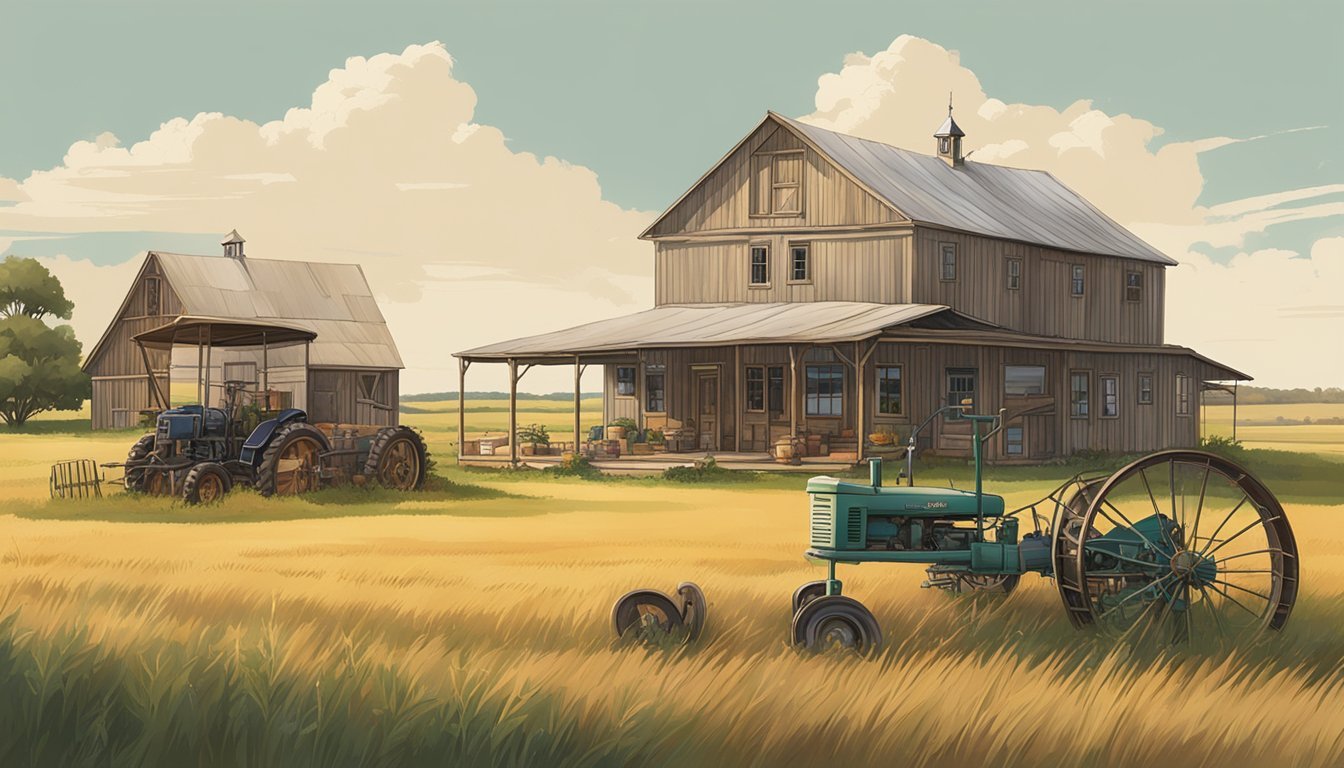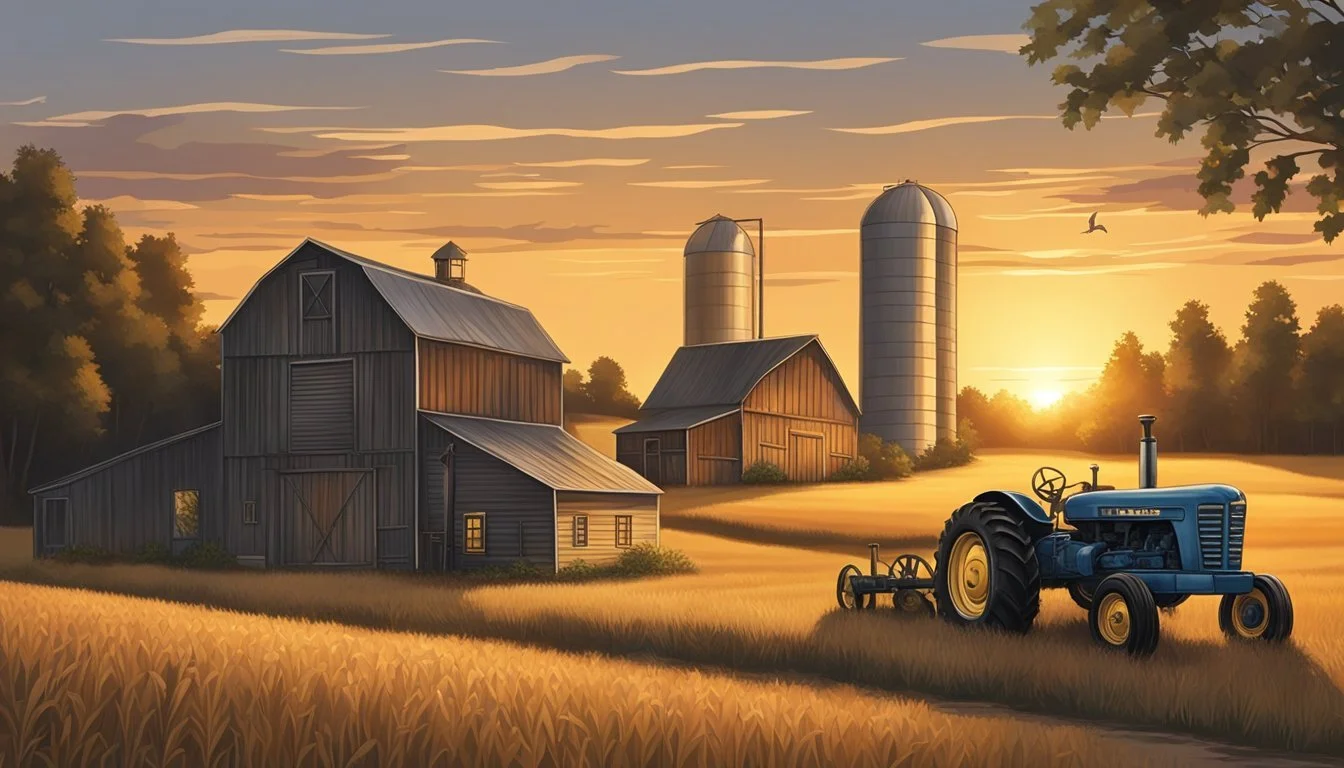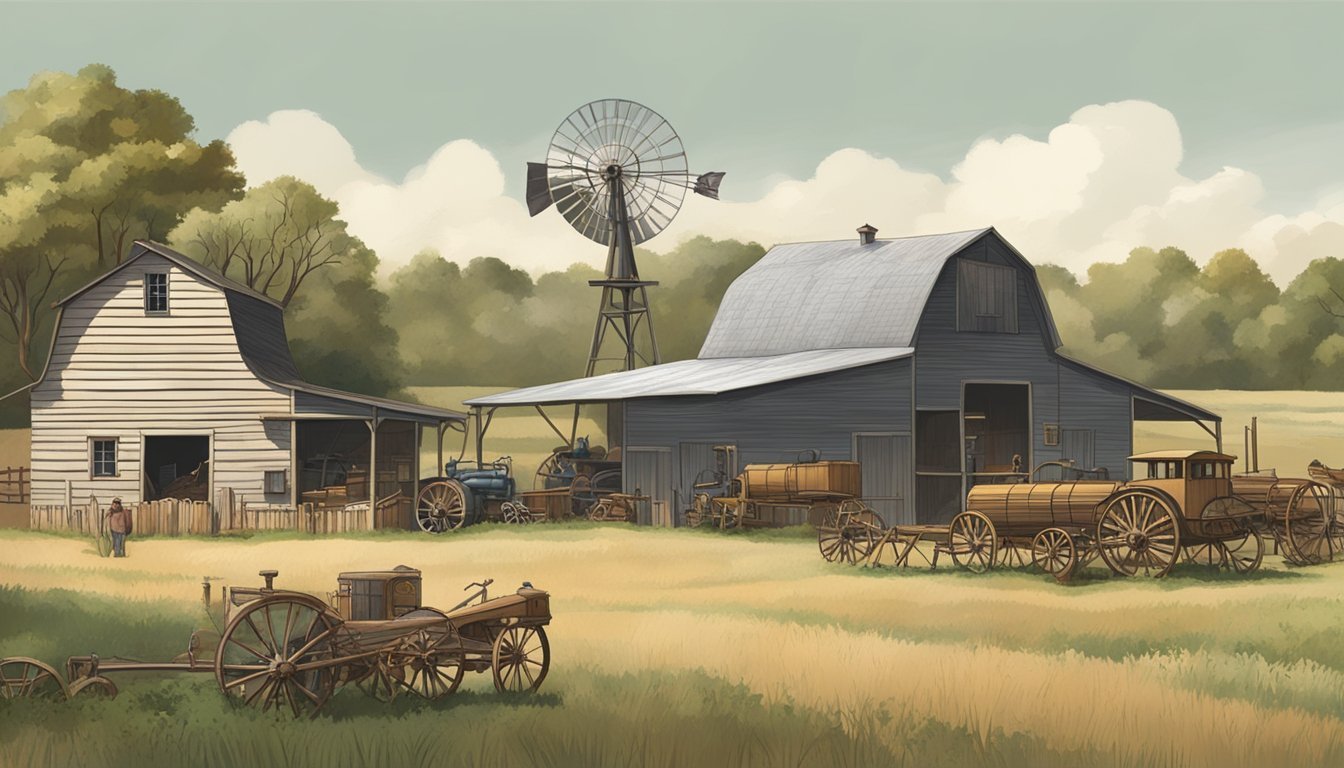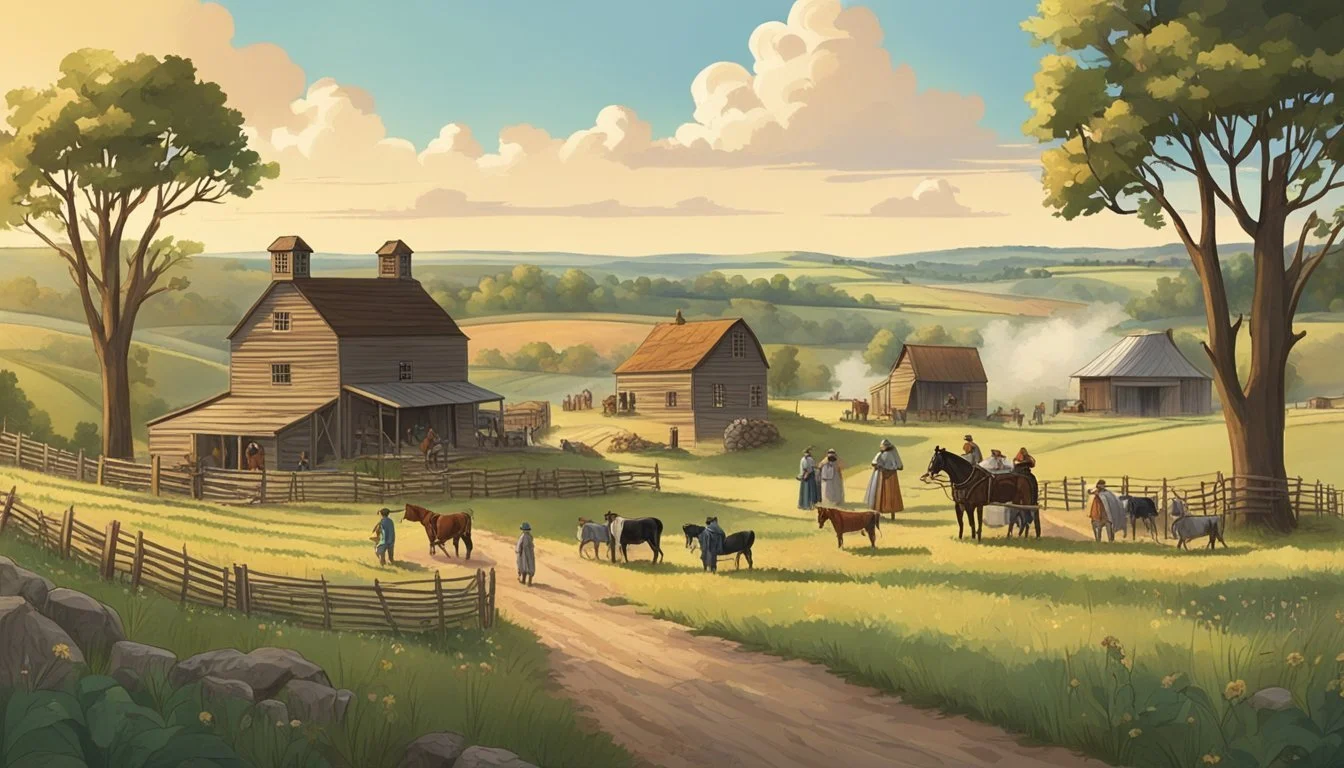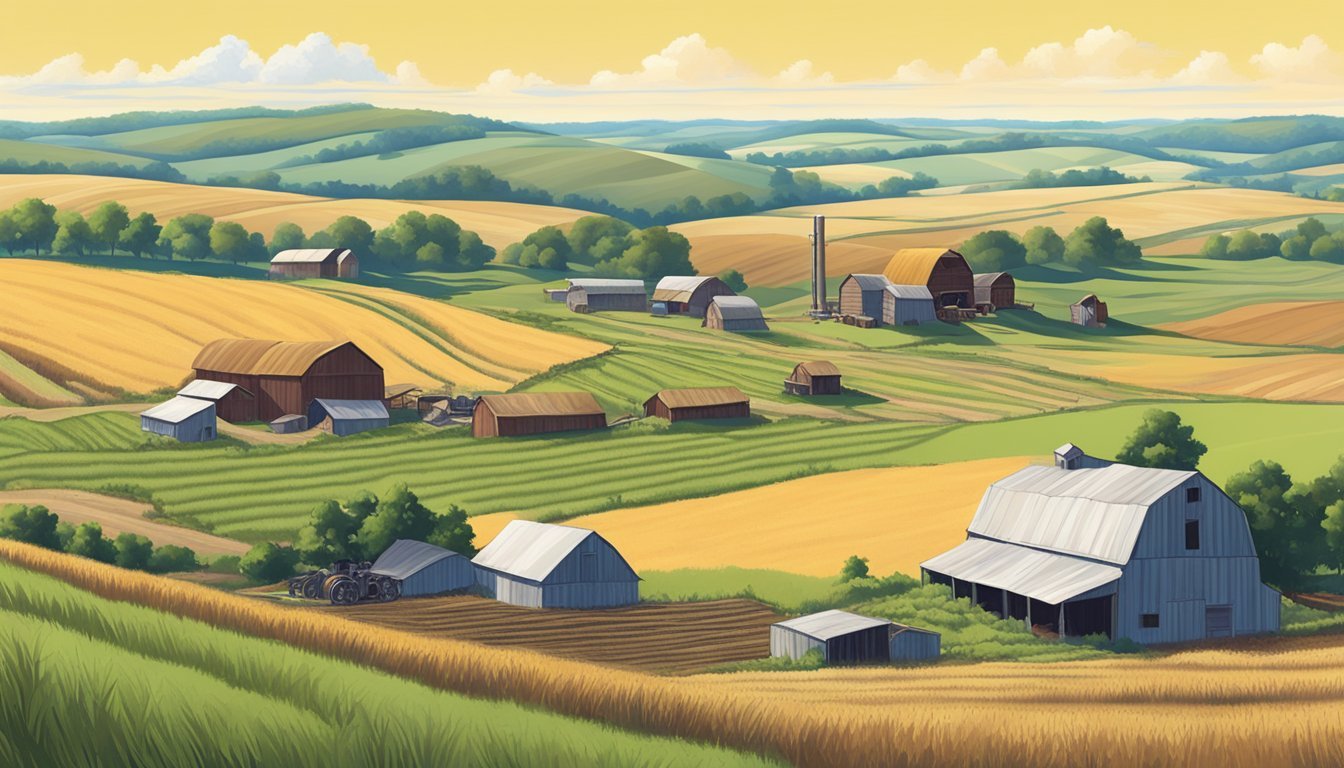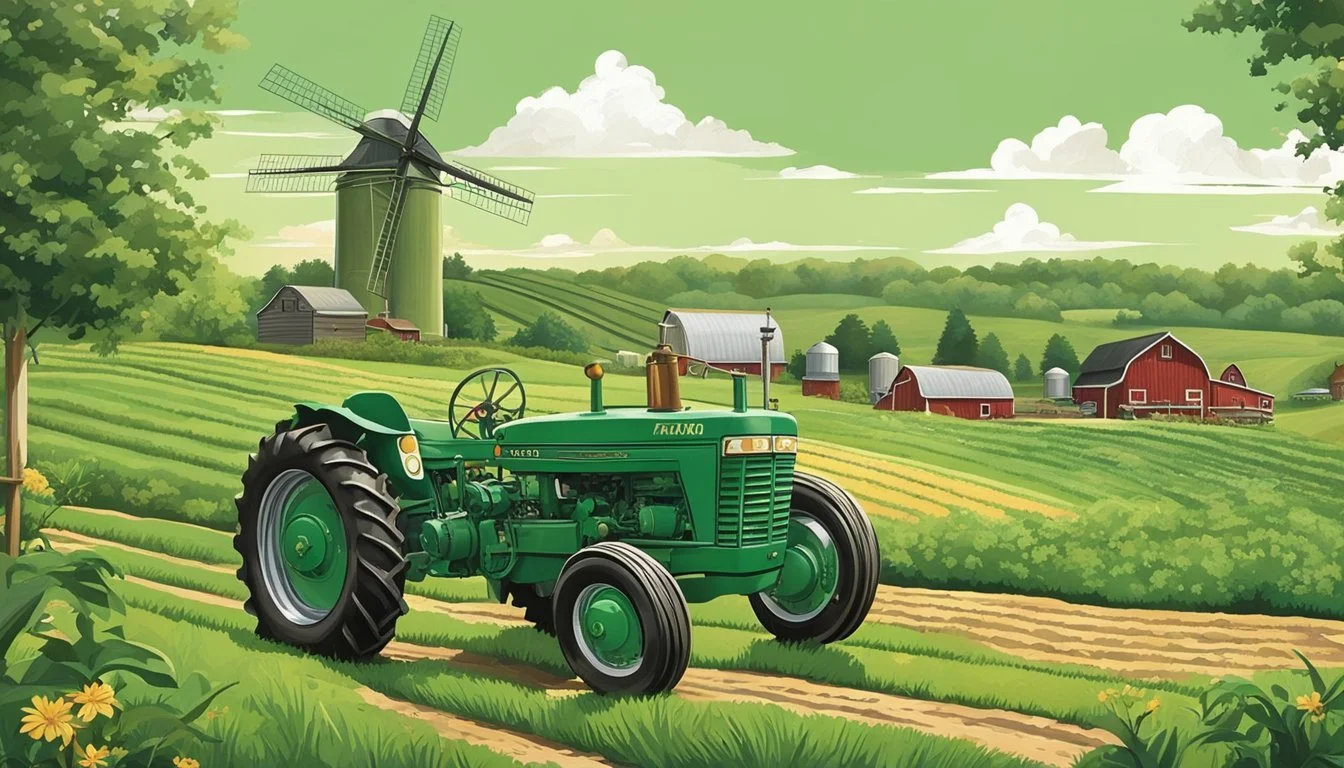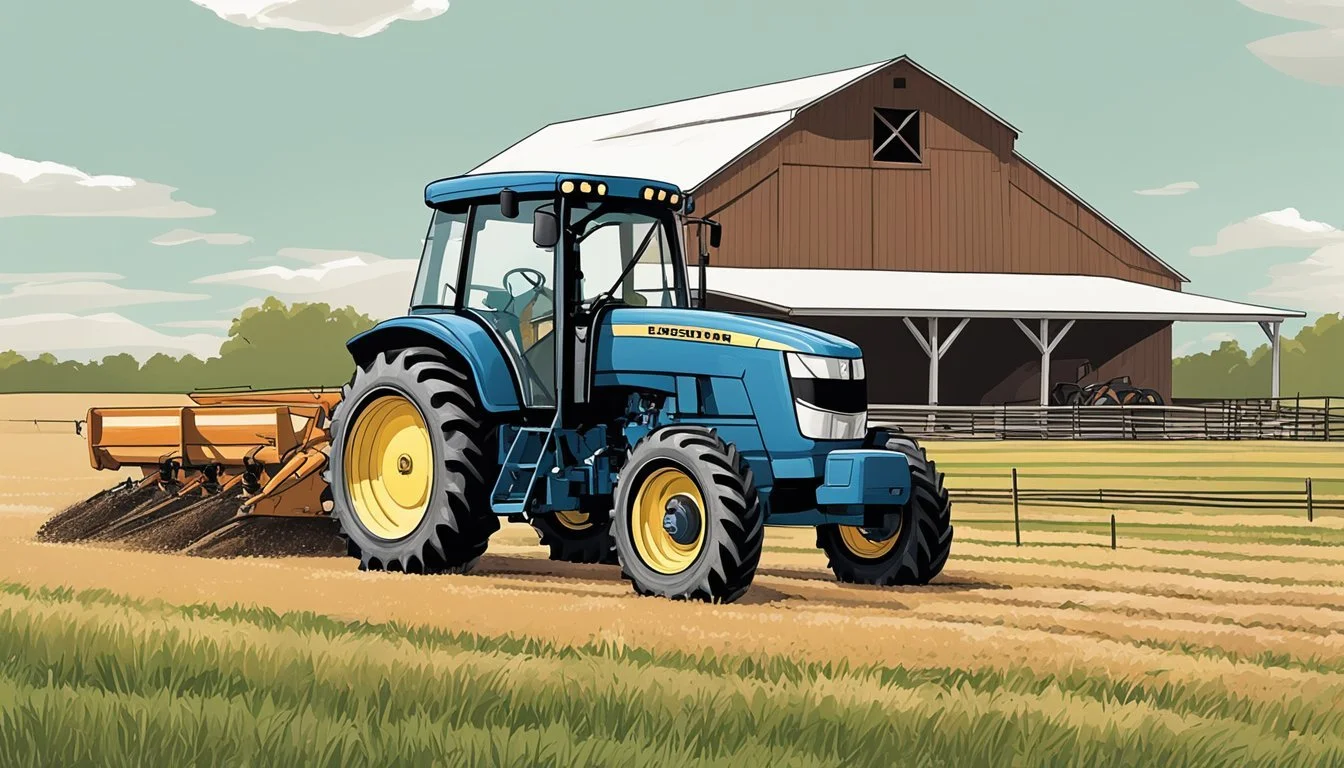Historical Farms and Agricultural Museums in Kansas
A Guide to Agrarian Heritage
Kansas, with its rich soil and wide-open spaces, has long been an agricultural heartland. The state's connection to farming runs deep, shaping its history and identity. Today, visitors and residents alike can explore this heritage through a number of historical farms and agricultural museums across the state. These sites offer a glance into the past, showcasing the evolution of farming technology and the lives of those who have cultivated the land for generations.
Among these destinations are iconic landmarks such as the National Agricultural Center and Hall of Fame in Bonner Springs. This facility not only pays homage to the leaders in agribusiness but also educates the public on the impact and contributions of agriculture in America. Another point of interest, the Historic Agriculture Agritourism attractions throughout Kansas, invite visitors to step back in time to experience the state's farming history and traditions.
These cultural institutions are fundamental in understanding the significance of agriculture in Kansas and beyond. They serve to remind us of agriculture's role in our heritage, the innovations that have propelled the industry forward, and the enduring spirit of the communities that have fed our nation through the centuries.
History of Agriculture in Kansas
Historical Kansas farms testify to the enduring legacy of agriculture in the state. As the backbone of the Kansas economy, agriculture has evolved from the labor of early settlers to a technologically advanced industry.
Settlers and Homesteading Kansas was once a vast prairie ripe for the homesteading wave of the late 19th century. Farming became a vital endeavor, with early farmers facing the challenges of weather and the Great Plains' landscape. Despite these hardships, these settlers were pivotal in establishing Kansas's agricultural dominance, particularly in wheat production, which earned the state its nickname, "The Wheat State."
Wheat and Corn By the early 20th century, Kansas had solidified its reputation for wheat cultivation. According to historical accounts, "All parts of Kansas grow good corn but in wheat Kansas can beat the world," echoing the importance of these crops. Kansas farmers have been recognized for their significant contributions to the grain supply of the United States, reinforcing their prominent position in national agriculture.
Technological Advances Advancements in farming techniques and machinery contributed to Kansas's increasing harvest yields, modernizing the agricultural sector and helping farmers work more efficiently.
The state celebrates its agricultural heritage at several historic sites, such as the Mahaffie Stagecoach Stop & Farm Historic Site, which offers a glimpse into life on a 19th-century farm. For those interested in the depth and breadth of Kansas farming history, the state's farms and ranches are not only places of production but also historical artifacts that tell the story of its past. These sites provide educational experiences that illustrate how Kansas has been and remains a cornerstone in the agricultural fabric of America.
Key Historical Farms in Kansas
Kansas, with its rich agricultural history, is home to several key historical farms and museums that preserve this heritage. These sites offer an in-depth look at the farming legacy and contribute to the cultural fabric of the state.
Bonner Springs Agricultural Hall of Fame
The National Agricultural Center and Hall of Fame in Bonner Springs serves as a testament to Kansas's deep agricultural roots. This institution not only commemorates the industry's past but also educates visitors about the significance of agriculture in America's development. Residents and visitors alike can explore a variety of exhibits and collections that detail the journey of farming throughout the years.
Sedgwick County Farmstead
In Sedgwick County, the Souders Historical Farm Museum offers a unique glimpse into the area's rural community. This museum showcases a recreated farmstead, providing families and friends a hands-on experience of historical farm life. It stands as a celebration of the county's legacy in agriculture, allowing visitors to step back in time and understand the day-to-day activities of early Kansas farmers.
Agricultural Museums and Collections
Kansas offers a rich tapestry of agricultural history through its museums and collections, preserving everything from vintage farm equipment to historical artifacts that tell the story of rural life.
Prairie Museum of Art and History
At the Prairie Museum of Art and History, visitors can explore an extensive collection that encapsulates the agricultural heritage of the region. The museum showcases artifacts from the pioneering era, including a genuine general store and a well-preserved school house, which together offer a window into the daily lives of early Kansas settlers. The Colby museum boasts outdoor exhibits, such as a traditional blacksmith shop and an original railroad depot, both integral to understanding the development of agriculture in the area.
Kansas Museum of Agriculture
Dedicated to the progression and history of farming, the Kansas Museum of Agriculture presents a vast collection of agricultural machinery and artifacts. The museum grounds feature a reconstructed Main Street, complete with period-appropriate buildings where visitors can immerse themselves in the rural Kansan experience. Not to be overlooked is the specialized poultry museum, documenting an essential part of the state's agricultural industry. Visitors can discover how the innovations in agriculture have shaped the landscape and livelihood of Kansas through informative exhibits and historical accounts.
Living History and Reenactments
Historical reenactments bring the past to life, offering educational and immersive experiences. Visitors can step back in time at various locations in Kansas and engage directly with living history. Two notable destinations for such experiences are Old Cowtown Museum and Historic Lecompton, where the traditions of the past are depicted through skilled reenactments and authentic demonstrations.
Old Cowtown Museum
Old Cowtown Museum presents a vivid reenactment of 19th-century farm life. Visitors can observe a working blacksmith shop, where the art of blacksmithing is demonstrated, illustrating the irreplaceable role blacksmiths played in rural communities. Farm equipment from the period is also on display and in operation, offering insights into the agricultural practices of the era. Hands-on activities allow guests to delve into historic skills essential for daily life in the past.
Historic Lecompton
Historic Lecompton is revered for its accurate portrayal of agrarian lifestyles, emphasizing gardening and the utilization of period-accurate tools and techniques. There, one can experience the cultivation methods that fed families and communities, showcasing a time when gardening was not just a hobby but a vital livelihood. The area resonates with historical significance, offering a profound connection to the everyday lives of Kansans from bygone days.
Educational Programs and Tours
Kansas is a place where the rich history of agriculture is preserved and shared through various educational programs and tours designed for visitors of all ages. The National Agricultural Center and Hall of Fame offers a glimpse into the past with educational programs that cater not only to general visitors but also to students. Schools may arrange field trips that are both educational and entertaining, and the programs are tailored to enhance the learning experience.
The historic schoolhouse on site provides kids with a vivid reenactment of a day in the life of students from the past, highlighting the evolution of education in rural settings. Utilizing authentic artifacts and interactive displays, children are engaged in a tactile way that reinforces educational content.
Field trip options may include:
Guided museum tours
Hands-on agricultural activities
Demonstrations of historic farming techniques
Private tours are also available upon request, offering a more personalized experience for families or specialized groups interested in in-depth information on specific subjects related to farming history.
For those wishing to explore historic agriculture at their own pace, self-guided tours are available at some locations where visitors can walk through time and learn at leisure about the traditions of Kansas farming families.
Through these experiences, one appreciates the state's commitment to preserving the legacy of agriculture. The educational programs and tours offer an opportunity to understand and value the contributions of earlier generations to the prosperity of Kansas and American farming.
Member Organizations and Networks
Kansas boasts a network of institutions dedicated to preserving its rich agricultural heritage. Among these, the Association for Living History, Farm and Agricultural Museums (ALHFAM) stands out as a pivotal entity. ALHFAM provides a platform for professionals and enthusiasts to share research, practical knowledge, and advances related to living history, farm, and agricultural museums.
Key Kansas Historic Farms and Agricultural Museums:
National Agricultural Center and Hall of Fame: Chartered by Congress, this center is a treasured repository of American farming’s history and its leaders.
Mahaffie Stagecoach Stop & Farm: Listed on the National Register of Historic Places, it offers a vivid peek into 1860s farm life.
Black Jack Battlefield and Nature Park: Here, visitors can explore a battlefield that pivoted the course of American farming post-civil war.
Membership Benefits:
Members of these organizations often gain access to special events, educational resources, and the opportunity to participate in community projects. The benefits facilitate the exchange of expertise and foster a collective effort in historical preservation.
Organization Focus Location ALHFAM Networking and professional development Nationwide National Agricultural Hall of Fame Education and honoring leaders in agriculture Bonner Springs, KS Mahaffie Stagecoach Stop Living history farm representing the 1860s farmers’ life Olathe, KS Black Jack Battlefield Preservation of natural and historical farming narratives Baldwin City, KS
These organizations, with their diverse memberships ranging from individuals to institutions, contribute significantly to conserving Kansas’ agricultural legacy. They promote public awareness and understanding of historic farming practices and their impact on contemporary agriculture.
Visitor Information and Resources
Visitors looking to explore Kansas' agricultural heritage will find an array of historic farms and museums rich with the state's farming history. Key resources for planning a visit, including location details and visitor reviews, are essential for a rewarding experience.
Planning Your Visit
Location Information:
For those wishing to delve into Kansas' agricultural past, one must-see destination is the National Agricultural Center and Hall of Fame located in Bonner Springs, near Kansas City. The Center is open seasonally, and potential visitors should verify current operating hours before making travel plans.
Hours of Operation:
Seasonal (check before visiting)
Admission Fees:
Adults: $5
Children: $2 (Rates as per the latest update, subject to change)
General Tips:
Recommended minimum length of visit: Half a day to fully enjoy the exhibits.
Wait time can vary; arriving earlier in the day can help avoid crowds.
For those traveling with family or in groups, some facilities offer accommodations suitable for both family and corporate events.
Reviews and Feedback
When deciding on a destination, prospective visitors can rely on the industry-leading trust & safety standards of TripAdvisor. Historical attractions in the area have various TripAdvisor member reviews that frequently mention an "interesting collection of artifacts" and note the educational value of the exhibits.
Recency and Descriptiveness: Recent reviews can be especially informative as they may mention changes or updates to exhibits and facilities.
User-Identified Themes: Look for common themes in feedback to gauge what experiences resonate most with visitors, which might include hands-on activities or the authenticity of the historical recreations.
Visitors are encouraged to contribute their own reviews on TripAdvisor to help others benefit from their experiences.
Cultural Impact and Community Involvement
Historical farms and agricultural museums in Kansas play a vital role in fostering a sense of community among residents. These institutions serve as educational resources, offering insight into the state’s rich agricultural heritage. They often facilitate interactions between community members, including gardeners, women, and families, who share a common interest in the cultivation and preservation of Kansas' farming past.
Community Engagement:
Historical sites conduct workshops aimed at both adults and children, promoting traditional farming techniques.
Festivals and seasonal events, such as harvest celebrations, bring together friends and families to appreciate the state's agricultural roots.
Education & Preservation:
Museums showcase the evolution of farming equipment, from hand tools to mechanized plows.
Educational programs target school groups, providing children with hands-on agricultural experiences.
Support for Local Gardeners:
They offer spaces for local gardeners to exchange knowledge about heirloom seeds and sustainable practices.
Special events are hosted to highlight the contributions of women in Kansas’ agricultural history.
By celebrating historical farm practices, these sites reinforce the importance of agriculture to Kansas' identity. They ensure that traditions remain alive not just in memory, but as a continual influence on contemporary agricultural practices.
Conservation and Historic Preservation
Conservation and historic preservation in Kansas play a central role in maintaining the state's agricultural heritage. Organizations and sites across Kansas are dedicated to conserving the physical integrity of historical farms and artifacts, ensuring that the rich history of the region's agriculture is not lost to time.
Kansas State Historical Society initiatives include the Kansas Rural Preservation program, which recently received a substantial grant to support properties in rural downtown areas. For historic agriculture, National Agricultural Center and Hall of Fame and the Mahaffie Stagecoach Stop & Farm Historic Site offer visitors a glimpse into the farming practices of the past, preserving important artifacts and buildings.
Key Conservation Efforts:
Restoration of historic farm structures.
Preservation of original farming tools and equipment.
Educational programs for the public.
Conservation of these sites often involves meticulous research to ensure that renovations and repairs respect the historical authenticity of the buildings. For example, preserving the original architecture of barns and farmhouses or using period-correct methods to restore farming implements.
Artifacts in these historic settings are treated with great care. From vintage tractors to household items, each piece helps to tell the story of Kansas's agricultural evolution. They are protected to prevent decay, allowing future generations to experience this integral part of American history.
The combined efforts of government grants and local advocacy ensure that Kansas’s rural and agricultural history remains a living part of the landscape. Through conservation and historic preservation, these historical farms and museums continue to celebrate Kansas's agricultural legacy.
Impact of Technology on Farming
Technological advancements have significantly influenced the landscape of Kansas farms over time. Technology's integration into this sector has catalyzed both productivity and sustainability within the agricultural industry.
Industry Dynamics: The evolution of technology has transformed Kansas from traditional gardening methods to a sophisticated industry that is integral to the statewide economy. It encompasses numerous agricultural businesses, including storage, transportation, and processing operations.
Farm Equipment: Modern farm equipment has made substantial contributions to productivity. This includes the transition from horse-drawn plows to tractors and combine harvesters, which have improved yield and efficiency, while reducing the manual labor required.
Innovation: Farmers have embraced innovation, leveraging it for various applications such as irrigation management, drone technology for crop monitoring, and genetic modification to create hardier crop varieties. The influence of these innovations is evident through the increased adaptability and resilience of Kansas's crops to various environmental challenges.
Productivity: Historical data shows a positive trend in productivity correlated with technological adoption on Kansas farms. Investment in technology has provided the tools necessary to maximize output and has proven essential in scaling operations to meet both domestic and international demands.
The integration of advanced technologies in Kansas agriculture clearly illustrates how essential they are to the state's economic success and the well-being of its farming communities.
Agriculture in the Kansas Economy
Agriculture plays a foundational role in the Kansas economy, contributing significantly to the state's financial health. Kansas is often termed the "Breadbasket of America," a title reflecting its sizable output of wheat and other crops. The synergy between the land and farmers in Kansas has forged an industry that is both robust and resilient.
The state's agriculture extends beyond wheat; it also leads in the production of sorghum, corn, and soybeans. The diversified nature of Kansas agriculture stabilizes the economy, ensuring that it is not solely reliant on one crop or product.
Economic Impact:
Production: Crops and livestock from Kansas play a crucial role in both domestic food supply and global exports.
Employment: The agricultural sector creates jobs not only on farms but also in related industries such as food processing and agricultural equipment manufacturing.
Revenue: Sales of agricultural commodities contribute to state and local tax revenues, aiding in the funding of community services and infrastructure.
Kansas has also adapted to modern agricultural methods, which has increased efficiency and output, further solidifying the sector's importance to the state’s economy. Sustainable practices and technological innovations, such as precision farming, have become more prevalent, reducing environmental impact while maintaining productivity.
The success of Kansas’s agriculture is interwoven with its historical identity and continues to shape its economic landscape. The state's commitment to preserving this heritage is demonstrated through establishments like the National Agricultural Center and Hall of Fame and regional educational sites that celebrate the past while looking to the future of farming.
Future of Farming and Museums
Sustainability is an underlying theme in the evolution of Kansas' historical farms and agricultural museums. These institutions are poised to adopt greener methods in both exhibits and day-to-day operations. They integrate renewable energy sources, such as solar and wind power, to showcase environmentally friendly farming practices.
Educational programs become more interactive, utilizing technology to create immersive experiences. Virtual reality could transport visitors to historical farming eras or future agricultural scenarios, while augmented reality might overlay information onto existing exhibits, making them more engaging.
Community involvement grows stronger as these museums and farms focus on inclusive programming. Libraries of heirloom seeds are made available to involve the public in the preservation of agricultural biodiversity, whereas community gardens on museum grounds educate and engage local residents in sustainable food production.
The role of technology in the future of farming is evident. Museums dedicate exhibits to the advancements in farm machinery and showcase the shift towards precision agriculture—a methodology that increases farm efficiency and reduces waste through the use of information technology and a range of items like GPS guidance, control systems, sensors, robotics, drones, autonomous vehicles, variable rate technology, automated hardware, and software.
To ensure continued relevance, museums also emphasize the importance of preserving traditional farming methods alongside modern improvements. This approach caters to a wide audience range, from students and history enthusiasts to farmers and agricultural professionals. Such engagement strengthens the educational impact and overall mission of these living history sites.

